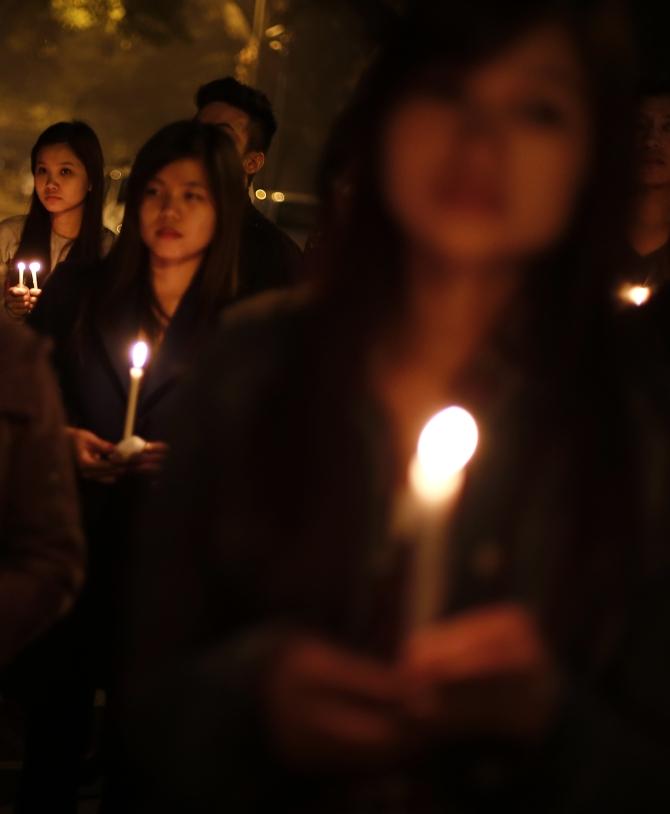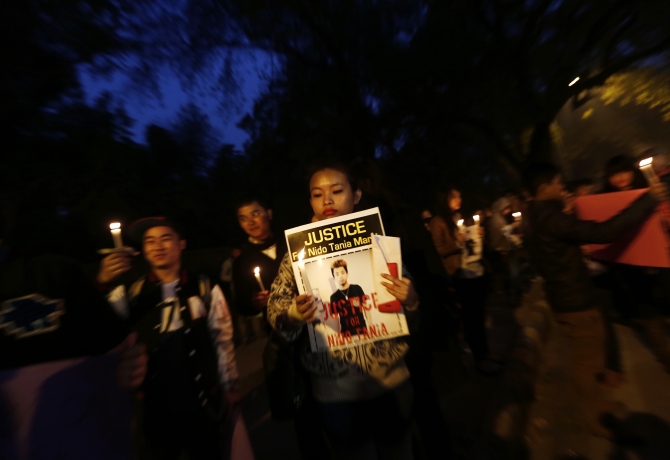Photographs: Reuters Niharika Pandit
Facing racial discrimination has become a part of daily life for a majority of youngsters coming from the northeast to the national capital, which touts its tag of being a cosmopolitan city.
Often referred to as 'chinki', 'chowmein' and 'momos', these youngsters say they have to resist discrimination and fight against abuses hurled at them by their compatriots.
Coming from the eight NE states of Assam, Nagaland, Manipur, Arunachal Pradesh, Meghalaya, Mizoram, Tripura and Sikkim, these youth hope to get better education and job opportunities in the national capital.
Women from northeast face worse harassment. They undergo traumatic experiences daily while living in the national capital region, comprising neighbouring Noida and Gurgaon.
Be it public transport, educational institutions or workplace, NE people feel those belonging to so-called mainland India discriminate against them because of their different facial features, hair style, dressing sense and language.
Despite hailing from an integral part of India, these survivors of racial abuse feel compelled to overlook instances of mental, physical and verbal assault on a daily basis.
However, days after the death of 19-year-old Nido Tania in a suspected case of racial killing, the cries for safer spaces for northeasterners have become louder.
Pemilla, a second year sociology student from Manipur, says she is always asked about her nationality.
"In college, based on my looks, many people have asked me if I am from China, Tibet or Nepal. They don't even know what northeast people look like, which is very shameful," she said.
The discrimination faced by Pemilla does not end here. Many a times, local shopkeepers have charged Pemilla more because of her East Asian looks, she claims.
Click on NEXT for more...
'I am scared to go out to the local market'
Photographs: Reuters Niharika Pandit
During her college days, Chanthoi Aheibam, now a trainee with Manipur Gun Survivors Network, would often snap at her classmates who did not want to pronounce her name correctly.
"Back in college, many classmates did not pronounce my name correctly. Even after correcting them several times, they called me ‘Cinthol’, which offended me," she said.
Earlier this week, when Members of Parliament from the northeastern states were called upon to address students, Agatha Sangma, a Lok Sabha member from Tura constituency in Meghalaya, had spoken about existing racism in the country.
Time and again, male students from the northeast have been compelled to relocate elsewhere after the locals ganged up against them.
Ngayeimi Huishunao, general secretary of the North East Students Association, lived in Kotla until three months ago. One day, he got into a fight with local youths who ganged up against him.
Yet, even after shifting to a new locality, he fears going to the market by himself.
"Even now I am scared to go out to the local market or walk around the neighbourhood by myself. This fear factor escalates when my sisters visit me," he said.
Pamei Abison from Manipur recalled how in his college, teachers often shun him because he could not speak Hindi.
He now mostly keeps quiet during lectures.
"Being a boy from the northeast in mainland India is difficult as there are times when physical violence is inflicted," he said.
Pushpa Gurung, a businesswoman originally from Nepal, has a different story to tell.
Click on NEXT for more...
'Racist jokes against me are very common'
Photographs: Reuters Niharika Pandit
Many a times, racial discrimination surfaces in everyday life which otherwise may pass off as stupid, she said.
"I have many friends so when we meet up; racist jokes against me are very common. I know they are only poking fun at me but a racist mentality is what we need to change," said Gurung.
Many activists and social welfare organisations feel that an anti-racial act is the need of the hour with programmes aimed at sensitising people about the country's plurality.
"A long-term solution will be a law that penalises acts of racial abuse. The committee formed by the Centre to suggest remedial measures to address concerns of people from the northeast is also a step forward as the country has accepted that racism exists," said activist Wanghring Rangang.
Many people don't report cases of abuse because they are scared to approach the police. The responsibility of the police also lies in registering an FIR and then taking quick action in cases of racial abuse, he added.
Click on NEXT for more...
TOP photo features you missed last week
Click on MORE to see another PHOTO feature...




article